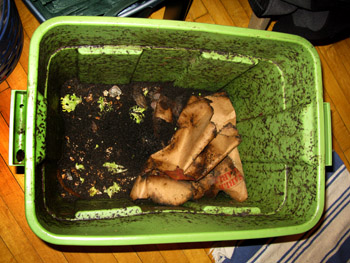Gardening with Chicagoist - Vermicomposting!
By Roger Kamholz in Food on Jun 15, 2011 4:40PM
 Vermicomposting: It means composting your food waste at home with the help of worms, and it's a clean, easy and effective way to produce nutrient rich soil that'll kick your backyard garden into overdrive without any help from fertilizers or other chemicals. Local vermicomposter Dana McKenzie Lee, who by day works in sales for a compostable-products manufacturer, recently walked us through the process of setting up and maintaining a compost bin powered by worms.
Vermicomposting: It means composting your food waste at home with the help of worms, and it's a clean, easy and effective way to produce nutrient rich soil that'll kick your backyard garden into overdrive without any help from fertilizers or other chemicals. Local vermicomposter Dana McKenzie Lee, who by day works in sales for a compostable-products manufacturer, recently walked us through the process of setting up and maintaining a compost bin powered by worms.
Back in April, Lee ran a worm-composting workshop at the Comfort Station in Logan Square. She stressed how easy it is keep the critters happy, comfortable and doing their thing - which is, well, eating your table scraps and pooping killer top soil. While some people might be wary of literally opening a can of worms in their home, the truth is worm bins are odor-free and pretty much idiot-proof.
The materials you'll need are inexpensive and readily available: two 10-gallon plastic storage boxes (Rubbermaid makes them), a power drill for making ventilation holes, newspaper for bedding, and about a pound of red wigglers (those are the worms; like pretty much everything else, you can buy 'em online). Known for their big appetites, red wigglers are the gold standard for vermicomposting.
The worms prefer a moderate to warm, steady environment, so keeping the bin indoors is ideal. Lee stashes hers in her home office, not far from the kitchen. But keeping your worm bin in the kitchen itself may prove easiest of all, since it's where the food is and by seeing the bin you'll be reminded to feed your new friends.
Although red wigglers can eat about half their weight a day (thus, a pound of worms will process a half pound of table scraps), they aren't omnivores. Feed them vegetables and fruit peels, bread and grains, spent tea bags and coffee grounds. Don't feed them meat or animal bones, dairy, greasy leftovers or anything that may have been sprayed with pesticides.
With proper care, your worms will yield compost in as little as eight weeks. Lee says patience is key; the worms can only eat so much, so if you overfeed them, food scraps may linger in the bin and lead to a stinky situation.
The real payoff comes after you harvest the compost. Mulch with it, mix it with plain soil when you plant in your garden, or top-off the pots of your houseplants with it.
For more detailed instructions on worm bin setup and upkeep, check out the Shedd Aquarium's online brochure, "The Care & Keeping of Worms" (pdf). Find more helpful resources here and here.